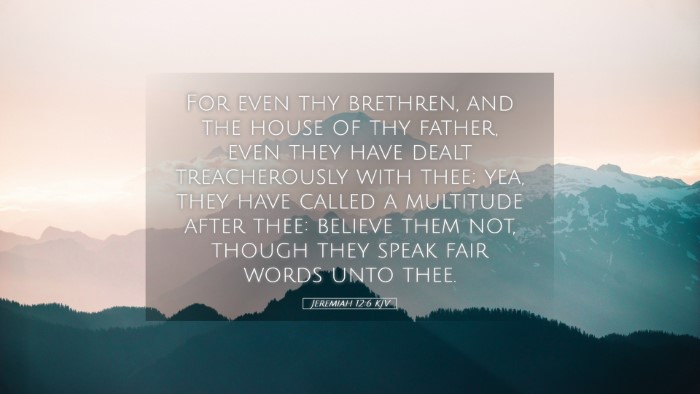Commentary on Jeremiah 12:6
Verse: "For even your brothers, the house of your father, even they have dealt treacherously with you; yes, they have called a multitude after you: believe them not, though they speak fair words unto you." (Jeremiah 12:6)
Contextual Overview
Jeremiah 12:6 finds its place within a larger discourse that dwells on issues of divine justice, prophetic ministry, and the relational dynamics between the prophet and his community. This verse emerges as a poignant reflection on betrayal, particularly from those nearest to Jeremiah, emphasizing the painful reality of rejection and hostility from one's own kin.
Insights from Public Domain Commentaries
Matthew Henry's Commentary
Henry expounds on the gravity of betrayal that Jeremiah faces from his own family. He notes that the verse encapsulates the broader theme of treachery that characterizes the people of Judah—those who are supposed to support Jeremiah are instead aligned against him. This treachery is articulated as coming even from the prophet's closest allies—his brothers. Henry emphasizes that the loyalty of one's household is a traditional expectation, yet here, it is drastically violated.
Henry underscores the divine insight Jeremiah holds about the nature of human relationships. He highlights how, despite the fair words and pleasantries offered by these treacherous relatives, there is an underlying deceit. The call to "believe them not" serves as a reminder to be cautious about accepting words without scrutinizing the intentions behind them.
Albert Barnes' Notes on the Bible
Barnes provides a detailed analysis of the figurative language in Jeremiah 12:6. He points out that the term "brothers" might extend to mean relatives or those within the Jewish community who would typically uphold one another in times of distress. However, this bond is eroded due to the contentious spirit prevailing among the people, leading them to abandon loyal ties.
Barnes interprets that the people of Judah are not merely backstabbing Jeremiah; their actions also reflect their broader rebellion against God. The betrayal showcases a significant spiritual decline, where family loyalty is sacrificed on the altar of personal ambition or societal pressures. He articulates that Jeremiah is therefore warned against emotional investments in those who might profess kindness yet harbor enmity.
Adam Clarke's Commentary
Clarke's commentary elucidates the socio-political context that frames this verse. He suggests that the "house of your father" can be interpreted in light of the historical struggles between the faithful and the unfaithful in Israel's heritage. Clarke posits that Jeremiah’s experience mirrors the trials of previous prophets who encountered similar animosities from their kin.
Clarke also discusses the term "a multitude" referring to the collective turning of the people against Jeremiah. He emphasizes the importance of recognizing insincerity in relationships, urging the reader to remain vigilant and discerning, particularly in leadership roles. The emphasis on not believing "fair words" speaks to a deeper principle of discernment in the face of flattering speech, which can often mask hidden agendas.
Theological Implications
Jeremiah 12:6 provides rich theological insights valuable for pastoral ministry, academia, and personal reflection:
- The Nature of Betrayal: The verse illustrates the depth of betrayal that may arise even from familial relationships, suggesting that faithfulness to God can sometimes place one at odds with loved ones.
- Discernment in Relationships: The command to not believe smooth words underscores the necessity for discernment when navigating relationships, relational dynamics within the church, or any leadership context.
- Prophetic Isolation: Jeremiah’s sorrowful state reflects the loneliness that may accompany prophetic ministry, and it serves as an encouragement for those under similar burdens to remain steadfast in their calling.
- Divine Justice and Human Treachery: The interplay of divine justice in the face of human treachery reveals broader themes of accountability and the consequences of national sin, calling for self-examination and repentance.
Conclusion
In summary, Jeremiah 12:6 serves as a poignant reflection on the complexities of human relationships, particularly amid the realities of prophetic ministry. Drawing on the insights from Matthew Henry, Albert Barnes, and Adam Clarke, we are reminded of the necessity of discernment in our interactions, the potential for betrayal within our closest communities, and the unwavering commitment required to fulfill our divine calling despite opposition.


